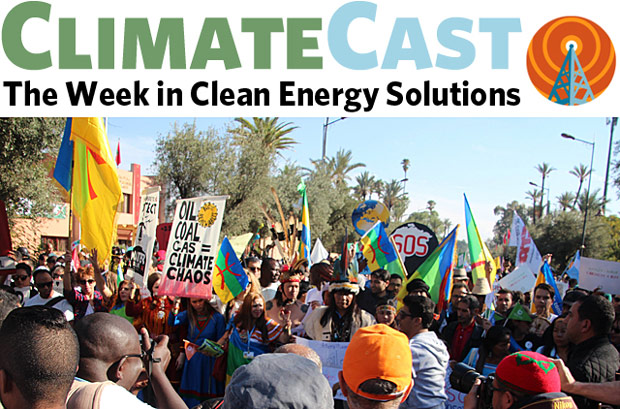Trump’s election reshapes climate landscape
In one stroke last week, Donald Trump’s election to the presidency reshaped the contours of what is possible for US climate policy, and shifted the tenor of the US climate movement from hopeful progress to desperate defense. Projections before Nov. 8 had already mapped out a rising “carbon wedge” that could be expected from Trump’s election, and Trump’s campaign had posted a pro-fossil 100-day energy action plan that has since been scrubbed from his website. But the full scope of the possible damage stems from the complete GOP control of Congress as well, since President Obama’s veto has been the only bulwark staving off anti-environmental budget riders. Although municipal and regional climate action will continue and clean energy prices will keep falling, climate action will be marching uphill into a stiff headwind for the next four years.
How quickly can Trump roll back progress?
Donald Trump’s election set off speculation about the strategies he will use to roll back support for clean energy and loosen regulations limiting climate pollution. He has numerous levers at his disposal, from opening federal lands to oil and gas exploration to overturning President Obama’s Clean Power Plan and reviving the Keystone XL pipeline. Automakers have already petitioned to relax new-car fuel economy standards, and the new president could rewrite the rules on utilities’ climate pollution, but legal experts cite precedent from past transitions to suggest it isn’t so simple to undo federal rules adopted with due process, unless Congress rewrites the law. Meanwhile, Trump’s appointments—including climate denier Myron Ebell to oversee the transition at the EPA—include numerous lobbyists whose presence is seemingly at odds with Trump’s campaign as an outsider “draining the swamp“” in Washington.
Marrakech reckons with US about-face on climate
Donald Trump’s unexpected victory cast a pall over the UN climate talks in Marrakech, as diplomats planned how to implement an agreement that might soon be missing a key partner. The US president-elect was reportedly mulling his options for a quick exit from the agreement, which would require only a year’s advance notice if he were to withdraw the US from the 1992 UN Framework Convention on Climate Change on which last year’s Paris accord is built. In Marrakech, delegates pondered how to send Trump a message of resolve. Nations as different as Saudi Arabia and China reaffirmed their commitment to the agreement regardless of US participation, the top EU negotiator reminded Trump that climate action is in US interests, and former French President Nicolas Sarkozy suggested a carbon tariff on imports from the US.
A few bright spots for climate farther down the ballot
Farther down the ballot, Florida voters rejected a deceptive utility-backed measure that would have undercut the economic case for rooftop solar. In Nevada, voters gave preliminary approval to end NV Energy’s monopoly and allow customers to choose their electricity supplier; the measure will require a second vote of the people in 2018 to take effect. Washington voters rejected I-732, a carbon tax that would have been balanced by reductions in other taxes, but Puget Sound voters joined 32 other US metropolises in approving public transit projects on the ballot. In California, Monterey County became the first significant oil-producing county in the state to ban fracking, with a 56-44 vote approving Measure Z.
Locus of US action now shifts to the states
With President-elect Trump promising to pull the plug on federal climate action, observers widely expect a growing focus on what states can do to curb their contribution to global warming. In Michigan, the state Senate voted last week to raise the Renewable Portfolio Standard from 10 percent—which utilities have already met—to 15 percent by 2021. In a nod to utilities’ interests, the bipartisan compromise places new requirements on “retail choice” electricity providers. In Washington State, the Alliance for Jobs and Clean Energy proposed a $15 per ton carbon tax, 70 percent of whose proceeds would be reinvested in clean energy and carbon reduction, with the rest easing the burden on workers, carbon- and trade-intensive businesses, and the working poor.
Courts to hear climate kids and fossil deception
A lawsuit aimed at compelling the federal government to reduce climate pollution can proceed to trial, a federal judge ruled in Oregon last week. The legitimacy of the suit, brought by Our Children’s Trust under the public trust doctrine on behalf of 21 plaintiffs ages nine to 20, was challenged by both the federal government and industry intervenors. The ruling sustains an order issued in April by a federal magistrate. In other courtroom developments, a class action suit was filed last week against Exxon Mobil for misleading investors about its recoverable oil and gas reserves, as persistently low prices have made them uneconomical to extract.
Trump’s impact on private energy sector uncertain
Markets reacted with ideological predictability to Donald Trump’s triumph at the polls, with coal stocks rising and clean energy shares lower at the end of last week. But Senate Majority Leader Mitch McConnell cautioned that Trump’s victory might not revive employment in the Appalachian coal fields since “it’s a private sector activity,” and analysts pointed out that Trump’s election will do nothing to reduce the market forces (such as cheap natural gas) arrayed against coal. Meanwhile, residential installer Sunrun reported a 23 percent increase in third-quarter solar installations, and the federal cost-cutting SunShot program announced new lower cost targets as solar power approaches the 6-cent-per-kWh target set in 2011. And the Global Sustainable Electricity Partnership—an alliance of nine companies from Europe, Asia, and North America that generate 30 percent of the world’s electricity—called for continued innovation and investment in a low-carbon future.
Image: Climate marchers in Marrakech, Morocco, last Sunday. Photo by Takver, via Flickr.




